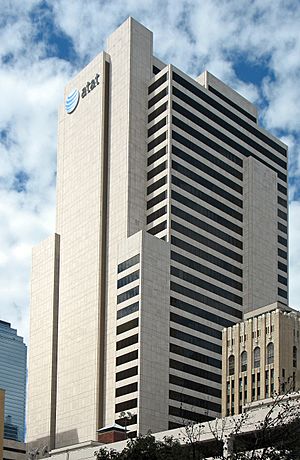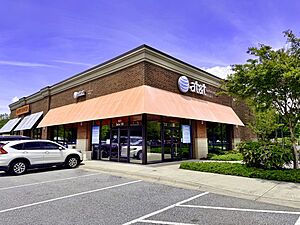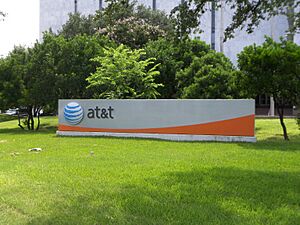- This page was last modified on 17 October 2025, at 10:18. Suggest an edit.
AT&T facts for kids
This page is about the holding company known as AT&T since 2005. For the American Telephone and Telegraph Company founded in 1886, see AT&T Corporation. For other uses, see AT&T (disambiguation).
"Southwestern Bell Corporation" redirects here. For the local telephone company founded in 1882, see Southwestern Bell.

Logo used since 2016
|
|||

Whitacre Tower, AT&T's corporate headquarters in Dallas
|
|||
|
Formerly
|
|
||
|---|---|---|---|
| Public | |||
| Traded as | |||
| ISIN | ISIN: [https://isin.toolforge.org/?language=en&isin=US00206R1023 US00206R1023] | ||
| Industry | |||
| Predecessors |
|
||
| Founded |
|
||
| Headquarters | Whitacre Tower,
,
United States
|
||
|
Area served
|
United States | ||
|
Key people
|
|||
| Products |
|
||
| Revenue | |||
|
Operating income
|
|||
| Total assets | |||
| Total equity | |||
|
Number of employees
|
140,990 (2024) | ||
| Divisions |
|
||
| Subsidiaries | Cricket Wireless | ||
|
|||
| Footnotes / references Financials as of December 31, 2024[update]. References: |
|||
AT&T Inc. is a giant American company that provides communication services. Its name is short for its old name, the American Telephone and Telegraph Company. It is headquartered in Dallas, Texas.
AT&T is one of the world's largest telecommunications companies. This means it helps people connect through phones, the internet, and television. It is also one of the biggest wireless carriers in the United States, along with T-Mobile and Verizon.
The company's story is long and complicated. The modern AT&T was formed when a company called SBC Communications bought its old parent company, AT&T Corporation, in 2005. The original AT&T was connected to Alexander Graham Bell, who invented the telephone. For most of the 20th century, AT&T had a near monopoly on phone service in the U.S. A monopoly is when one company has almost complete control over a product or service.
Today's AT&T was built by bringing together many parts of the old phone system, including four of the seven "Baby Bells" that were split off from the original company.
Contents
History of AT&T
How AT&T Began
The story of AT&T starts with the invention of the telephone. After Alexander Graham Bell patented the telephone in 1875, he and his partners started the Bell Telephone Company. This company grew quickly.
In 1885, a part of the company called the American Telephone and Telegraph Company (AT&T) was created. By 1899, AT&T had become the parent company of the entire Bell system. For many years, AT&T and its local companies were the main providers of phone service in the United States. This powerful network was called the Bell System, and people often called the company "Ma Bell."
The Breakup of the Bell System
By the 1980s, the U.S. government decided that AT&T's monopoly was too powerful. In 1982, a judge ordered the company to be broken up. This event is known as the breakup of the Bell System.
AT&T had to sell its local phone companies. These companies were grouped into seven new regional businesses, nicknamed the "Baby Bells." One of these Baby Bells was Southwestern Bell Corporation (SBC). After the breakup, the original AT&T focused on long-distance calls and faced new competitors.
A New AT&T is Formed
SBC, one of the Baby Bells, started to grow by buying other companies. It bought two other Baby Bells: Pacific Telesis in 1997 and Ameritech in 1999.
Then, in 2005, SBC made a huge move. It bought its former parent company, AT&T Corporation. After the purchase, SBC decided to use the more famous AT&T name and logo. This is how the modern AT&T Inc. was born.
The new AT&T continued to grow. In 2006, it bought BellSouth, the last independent Baby Bell. This gave AT&T full control of Cingular Wireless, which was then renamed AT&T Mobility.

An AT&T retail store in Asheville, North Carolina
Big Changes and New Services
AT&T has continued to change and expand its business into new areas.
Buying DirecTV and Time Warner
In 2015, AT&T bought DirecTV, a major satellite TV provider. This allowed AT&T to offer TV services along with its phone and internet plans.
In 2018, AT&T bought Time Warner, a huge media company that owned HBO, Warner Bros. movie studio, and many TV channels. AT&T renamed it WarnerMedia. The goal was to combine communication services with entertainment content.
Selling Media Companies
A few years later, AT&T changed its strategy again. In 2022, it separated from WarnerMedia. WarnerMedia then merged with Discovery, Inc. to create a new company called Warner Bros. Discovery. This meant AT&T was no longer in the business of making movies and TV shows.
AT&T also sold other parts of its media business, like the video game company Crunchyroll and the entertainment news site TMZ.
2024 Data Security Incident
In 2024, AT&T was one of several companies affected by a data security problem involving a company called Snowflake. Information like phone and text logs of many AT&T customers was exposed. The U.S. government took an interest in the case because of its size and importance.
AT&T's Main Businesses Today

AT&T office in San Antonio, Texas
AT&T is a massive company with its main offices in Dallas, Texas. It has different divisions that handle its various services.
- AT&T Communications: This is the largest part of the company. It provides mobile phone service, internet, and business solutions across the United States.
- AT&T Latin America: This division offers wireless service in Mexico.
- Landline Service: AT&T still provides traditional home phone service in 21 states.
Working with the Government
Like many large companies, AT&T is involved in politics. It talks to government officials about laws that could affect the telecommunications industry. This is called lobbying. The company wants to make sure new rules are good for its business.
For example, AT&T has discussed topics like how the internet should be regulated. It also gives money to political campaigns for both Republican and Democratic candidates.
Naming Rights and Sponsorships
AT&T pays to have its name on buildings and sports venues. This is a form of advertising. Some famous places with the AT&T name include:
- AT&T Stadium in Arlington, Texas, home of the Dallas Cowboys football team.
- AT&T Center in San Antonio, Texas, where the San Antonio Spurs basketball team plays.
- Jones AT&T Stadium in Lubbock, Texas, a college football stadium.
The company also sponsors many sports teams and events, including:
- Major League Soccer
- The U.S. men's and women's national soccer teams
- The National Basketball Association (NBA)
- The College Football Playoff National Championship
Images for kids
-
Former CEO Randall L. Stephenson at the 2008 World Economic Forum
See also
 In Spanish: AT&T para niños
In Spanish: AT&T para niños
- List of United States telephone companies
- List of mobile network operators in the United States
- List of telecommunications companies
- Bell System
- Breakup of the Bell System
- Room 641A

